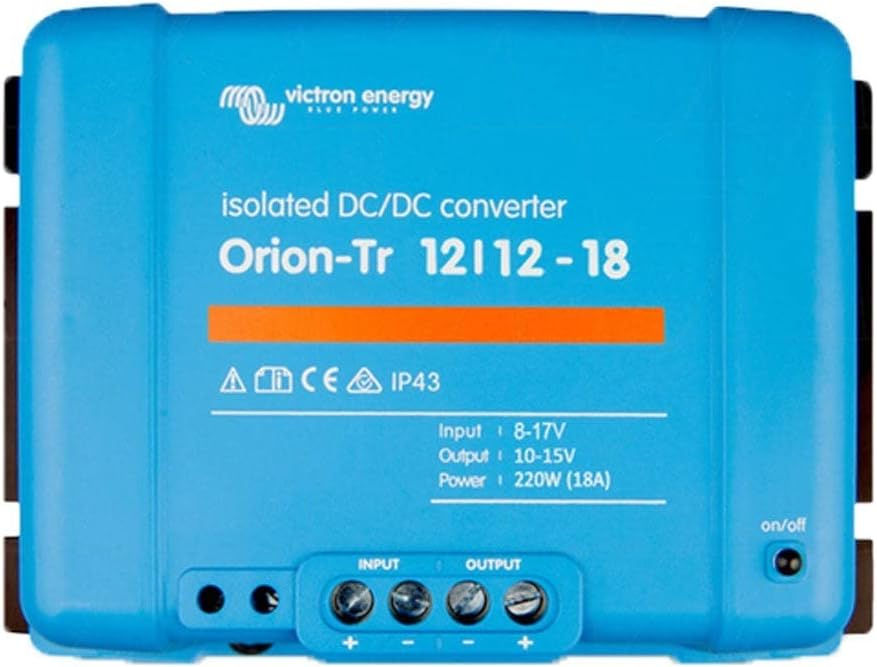Best DC-DC Charger for boats: Victron Orion-Tr DC-DC 12/12-18A vs. Renogy 12V 20A charger
- Thomas Flinskau
- Aug 28, 2023
- 4 min read
Updated: Oct 19, 2023
In the universe of off-grid energy solutions, the selection of a DC-DC charger is essential for efficient power management and preserving battery health.

This review delves into a detailed assessment of two prominent contenders: the Victron Orion-Tr DC-DC 12/12-18A Isolated DC-DC Charger and the Renogy 12V 20A DC to DC On-Board Battery Charger to see whitch one is the best DC-DC charger for boats.
These devices are designed to facilitate DC-DC conversion for off-grid applications for boats, but they come with distinct features that warrant close examination. We will evaluate these features across various parameters to determine the optimal best for off-grid enthusiasts at sea.
Victron Orion-Tr DC-DC 12/12-18A Isolated DC-DC Charger:
Pros:

Advanced MPPT Technology
The Victron Orion-Tr DC-DC charger incorporates Maximum Power Point Tracking (MPPT) technology, optimizing energy conversion by capturing the maximum available power from the input source. This feature ensures high efficiency and optimal energy utilization, even if input conditions from the boats vary.
Wide Input Voltage Range
The charger accommodates a broad input voltage range with solid terminals, making it versatile for various energy sources such as alternators, solar panels, and wind turbines. This adaptability enhances its suitability for complex setups on boats.
Battery Compatibility and Management
With support for multiple battery chemistries, the Victron charger's intelligent charging algorithms cater to specific battery requirements. This tailored approach enhances battery life and safety whitch is important at sea.
Remote Monitoring and Control
The charger offers advanced connectivity options via Bluetooth and integration into the Victron monitoring ecosystem. Users can remotely manage and monitor their charging system, facilitating optimal energy usage and issue diagnosis even when you are not onboard.
Robust Protections
The Victron charger is equipped with comprehensive built-in safeguards, protecting against over-voltage, over-current, and over-temperature situations. This design ensures reliable performance under challenging environmental conditions.
Cons:
Higher Learning Curve
The advanced features and customization options of the Victron charger may require users to invest time in understanding its functionalities, potentially leading to a steeper learning curve.
Higher Initial Cost
The initial investment for the Victron charger might be higher compared to simpler alternatives, which could impact budget-conscious boat owners.
Potentially Overwhelming for Basic Setups
The charger's extensive capabilities might be excessive for users with straightforward off-grid setups, potentially making it more complex than necessary.
Installation Complexity
While the installation process is manageable, the charger's broader capabilities could make the installation process slightly more involved.
Integration Dependencies
Full utilization of remote monitoring features might require integration into the Victron ecosystem, potentially limiting flexibility for users seeking more diverse monitoring options.
Renogy 12V 20A DC to DC On-Board Battery Charger:
Pros:

Simplicity and User-Friendly
The Renogy charger offers straightforward installation and an intuitive user interface, making it accessible to users with varying technical backgrounds.
Stable Output Performance
While lacking MPPT, the charger delivers stable output performance, which is suitable for less dynamic off-grid setups.
Cost-Effective Solution
The Renogy charger provides a cost-effective option for those seeking a basic, reliable DC-DC charging solution without the additional complexities of advanced features.
Compatibility
The charger is compatible with various battery chemistries, offering flexibility for users who might have diverse battery types in their motorboat or sailboat.
Compact Design
The compact form factor and simplified operation make the Renogy charger suitable for space-limited installations whitch often is the case on a boat and users looking for a hassle-free solution.
Cons:
Limited Input Voltage Range
The Renogy charger's narrower input voltage range might limit its adaptability to various energy sources, potentially restricting its versatility in certain setups.
Lacks Advanced Battery Management
The charger's charging profiles might not be as fine-tuned to specific battery types as more advanced units, potentially impacting battery life in the long run.
Less Comprehensive Connectivity
While functional, the Renogy charger might lack the extensive connectivity and remote monitoring options provided by more advanced alternatives.
Potential Underutilization
Users seeking a more sophisticated solution for managing multiple energy sources or specialized battery requirements might find the Renogy charger's simplicity limiting.
Less Emphasis on Optimization
The absence of MPPT technology in the Renogy charger could lead to suboptimal energy utilization, especially in scenarios with varying input conditions.
Summary Best DC-DC Charger for boats: Victron vs. Renogy
In summary, both the Victron Orion-Tr DC-DC 12/12-18A Isolated DC-DC Charger and the Renogy 12V 20A DC to DC On-Board Battery Charger have their distinct advantages and considerations.
The Victron charger shines with its advanced MPPT technology, wide input voltage range, intelligent battery management, remote monitoring capabilities, and comprehensive protections. It is optimal to users seeking optimal performance, adaptability, and a future-ready solution on their boat.
On the other hand, the Renogy charger's simplicity, user-friendliness, cost-effectiveness, and compact design make it a solid choice for those with basic off-grid setups, limited technical familiarity, or tighter budgets when at sea.
Ultimately, the decision between these two chargers hinges on the specific requirements, preferences, and long-term goals of the user's off-grid energy system. It's essential to consider factors such as the complexity of the setup, the desired level of control and monitoring, the battery types in use, and the willingness to invest time and resources in learning and optimizing the charging system on the boat.
Regardless of the choice made, both chargers contribute to enhancing the resilience and sustainability of electrical power systems on motorboats and sailboats.
(Amazon)
(Amazon)

Comments